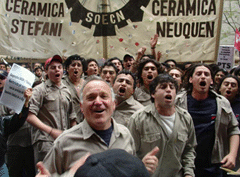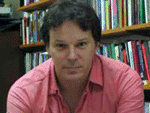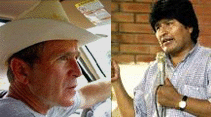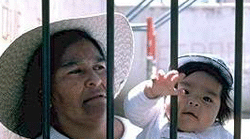
Archives


Teach Me if You Can: An Interview with David Graeber
David Graeber is a professor of anthropology at Yale University. After becoming an activist for the anarchist cause, Graeber received disdain from a few colleagues and was soon informed that his teaching contract would not be renewed. On Nov. 2, I had lunch with Graeber at Yale.
Steven Durel: Professor, it's probable that Yale's leadership decided not to renew your contract because you are an acclaimed anarchist scholar and because you have been active with supposedly "subversive" groups on campus. How do you feel? Aren't you upset?

Eyes on US Troops in Paraguay as Bolivian Election Nears

Sliding into the Soap Dish of the US War on Drugs
They call it La Jobónera, the "soap dish." I thought the nickname had been born because at first glance, the place looks like a wash-by-hand laundromat. Clotheslines run criss-cross through the open patio, giving shade like a tree as it drips dry above a place that feels more like hopelessly passing time than life. There is a constant scrubbing noise. Water is always running somewhere. Braids are tied back and sleeves are rolled up. But no, I was wrong. The "soap dish" has nothing to do with spending hours a day soaking and scrubbing soapy clothes. It gets its name because both getting in and getting out is slippery. Welcome to the San Sebastian prison. La Jabónera is not just any prison. It is a confined residence for women, most of them supposed narco-traffickers, and their children. A jail that does not provide food to its prisoners. A jail filled with 112 women, many of who do not know how long they will reside there, and are guilty until proven innocent.

The Wal-Martization of America and the High Cost of Low Price
As a history teacher for two decades now, the single best field trip I've ever taken with students involved a visit to a "local" Wal-Mart in

Sacramento City Council Votes For Withdrawal From Iraq
The Sacramento,CA City Council, by an 8 to 1 vote on November 1, called for "a humane, orderly, rapid and comprehensive withdrawal of United States military personnel and bases from Iraq." The Council also asked Congress and Bush to deliver "promised veterans' health, education, disability, and rehabilitation benefits, and otherwise meet the needs of returning veterans." Sacramento joins a growing list of cities, including Chicago, San Francisco and Philadelphia, calling for withdrawal. California's capital city is the second community in the Central Valley after Davis to support an anti-war resolution.
